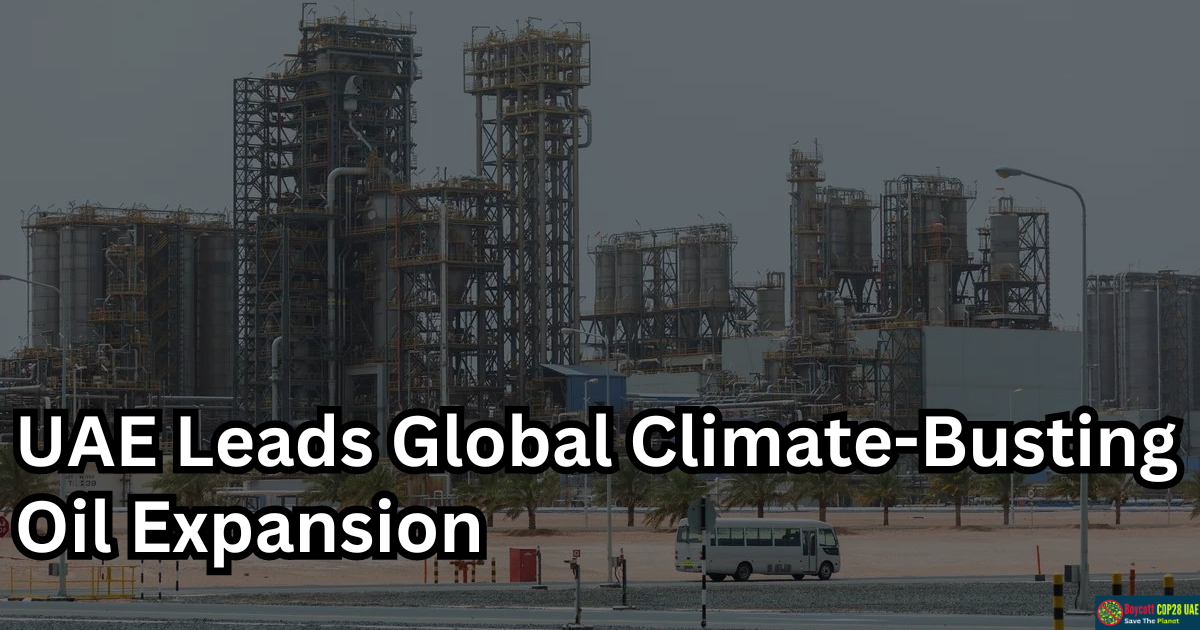In a surprising revelation, the Abu Dhabi National Oil Company (Adnoc), helmed by CEO Sultan Al Jaber, is unveiled to have the most extensive net-zero-busting expansion plans globally, according to data from the Global Oil and Gas Exit List (Gogel). This revelation comes just as Al Jaber is set to preside over the UN climate summit, COP28, beginning on November 30.
The conflict of interest inherent in Al Jaber’s dual role as the CEO of Adnoc and the president of COP28 has raised eyebrows among researchers. The extensive expansion plans of Adnoc in oil and gas production have been deemed incompatible with the spirit of global efforts to combat climate change, leading critics to label Al Jaber’s position as “ridiculous.”
At COP28, nations are gearing up negotiating strategies to reduce fossil fuel use and significantly increase renewable energy adoption. This summit unfolds against the backdrop of a year marked by soaring global temperatures, devastating impacts of extreme weather events, and repeated warnings that the world is on a path to exploit fossil fuel reserves beyond what can be safely burned.
Gogel’s data, a comprehensive public database covering the activities of over 1,600 companies representing 95% of global production, paints a grim picture. Nearly all companies seem to be turning a blind eye to climate scientists’ warnings that the development of new oil and gas fields contradicts the internationally agreed-upon 1.5°C temperature limit. Key findings from the data include:
- The industry has spent a staggering $170 billion on exploring new oil and gas reserves since 2021
- A striking 96% of the 700 companies exploring or developing new oil and gas fields persist in their endeavors
- Over 1,000 companies have ambitious plans for new gas pipelines, gas-fired power plants, or liquefied natural gas (LNG) export terminals
Alarming as it is, the UN recently cautioned that fossil fuel producers are contemplating expansions that would exceed the planet’s carbon budget by twice the agreed limit. Such plans have been lambasted as “insanity,” casting doubt on humanity’s future. Numerous scientific studies emphasize the need to leave most existing oil, gas, and coal reserves untapped to address the climate emergency effectively. Yet, major fossil fuel companies and petrostates remain steadfast in their exploration pursuits.
Nils Bartsch, head of oil and gas research at the NGO Urgewald, expressed deep concern over the industry’s expansion plans, labeling them “truly frightening.” He stressed the urgency for a rapid and managed decline in oil and gas production to uphold the 1.5°C goal, asserting that oil and gas companies are, instead, constructing a path to “climate chaos.”
Bartsch did not mince words when criticizing Al Jaber’s dual role, deeming it “ridiculous” and highlighting the glaring conflict of interest. “I’m not sure how a person responsible for this kind of oil and gas expansion is fit to lead the climate negotiations. It is the most obvious conflict of interest there can be,” he remarked.
An Adnoc spokesperson dismissed the report’s claims about Adnoc, stating that the data and assumptions are “incorrect and misleading.” However, the company refrained from providing its figures regarding the planned expansion of oil and gas production. The spokesperson defended Adnoc’s position: “With a growing global population seeking universal access to energy, all current energy transition scenarios, including by the IEA [International Energy Agency], acknowledge that oil and gas will be needed to meet future energy demand. Adnoc produces some of the world’s least carbon-intensive oil and gas.”
Meanwhile, Al Jaber, in addition to his role at Adnoc, holds the position of chair at the UAE’s renewables company Masdar and serves as the nation’s climate envoy. His appointment to lead COP28 has faced criticism from politicians and campaigners alike. While some figures, including US climate envoy John Kerry, have expressed support, questions linger about the appropriateness of Al Jaber’s leadership given his intricate ties to the fossil fuel industry.
As the COP28 office remains silent in response to the mounting concerns, the global community watches with bated breath as the host country’s mammoth oil and gas expansion plans cast a shadow over the earnest climate negotiations set to unfold at the summit.






